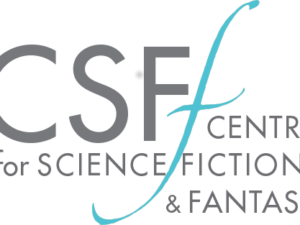
This week’s PhD student profile is of Amber Logan.
Tell us about your research!
I am writing a slipstream novel retelling Hans Christian Andersen’s fairy tale “The Shadow,” set in near-future Japan. It is highly influenced by the work of Haruki Murakami, and the research for my exegesis delves into such disparate-sounding topics as techo-animism, fairy tales, and psychoanalysis.
What was your introduction to SFF?/How did you come to SFF?
I first started getting really into SFF around the age of 12 when my older sister introduced me to the Dragonlance novels by Margaret Weis and Tracy Hickman. It was actually a shared love of those books which brought me and my husband together as teenagers (fun fact: our wedding rings are patterned with ivy leaves, a reference to a ring exchanged by the characters Tanis and Laurana in the series).
What does SFF do for you that other genres do not?
I think SFF stretches my mind in ways that other genres don’t. While a great twist-ending in a mystery can be exciting, it is rare that a non-SFF book makes me see the world in a new light or opens my mind in a really visceral way.
Where do you see SFF going in the next 10 years? 20 Years?
I think SFF will continue to become more diverse. In the past five years we’ve seen a lot of SFF based on non-European worlds, and stories featuring more PoC characters and marginalized perspectives. I believe this will increase in the next 10 or 20 years. SFF is all about exploring new concepts and pushing boundaries, and I think the SFF community has started to embrace the idea that the more voices we hear from, the more exciting ideas we can come up with.
What overlooked or lesser known works would you recommend to readers and academics and why?
Where to begin?? I of course think everyone should read Haruki Murakami, but it would be pushing it to call his books “overlooked,” so instead I’ll suggest Scandal by Shusaku Endo for its fantastic doppelgänger narrative. I’ve been reading a lot of mermaid and merman books lately (the book I’m hoping will be my debut novel involves a merman of sorts), and I would highly recommend The Mermaid and Mrs. Hancock by Imogen Hermes Gowar for those who like historical fantasy, or The Brides of Rollrock Island by Margo Lanagan for its gorgeous fairy tale feel. Making History is a terrific alternate history book (what would happen if Hitler wasn’t born, but someone worse took his place?) by Stephen Fry and it definitely doesn’t get enough love. And finally, for younger readers, everything I’ve read by Natalie Babbitt has been amazing; lots of people have read Tuck Everlasting, but few have read her other works, which is a shame. They are gorgeous and provide just the right amount of the surreal.
For more information about Amber and her publications, you can visit her bio on the Members page.



